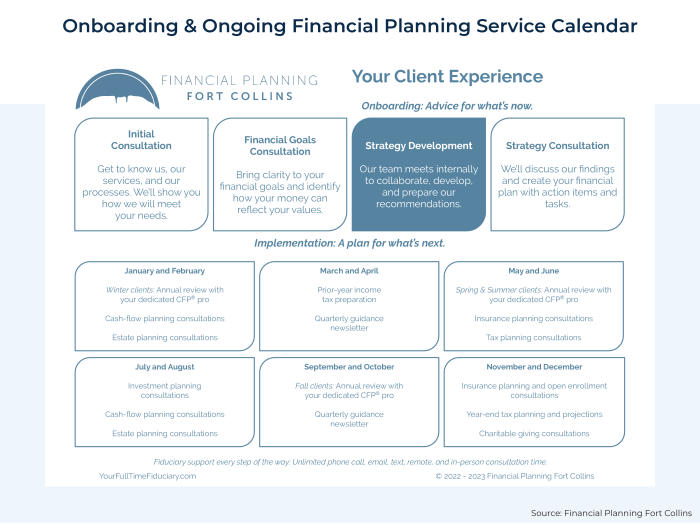How to Spot a Trustworthy Financial Planning Service
When it comes to identifying a reliable financial planning service, certain key factors play a crucial role. From reputation to transparency in fee structures, the journey to finding a trustworthy service is filled with essential markers that guide your decision-making process.
As we delve deeper into the realm of financial planning services, understanding these factors becomes paramount for making informed choices regarding your financial future.
Factors to Consider

When searching for a trustworthy financial planning service, there are several key factors to consider that can help you make an informed decision. These factors can provide insight into the reliability and credibility of the service, ensuring that your financial future is in good hands.
Importance of Reputation and Track Record
Building a solid reputation takes time and consistent delivery of high-quality service. A financial planning service with a strong reputation and a proven track record of success is more likely to be trustworthy. Look for reviews, testimonials, and client feedback to gauge the reputation of the service provider.
Transparency in Fee Structures
An important aspect of trustworthiness in financial planning services is transparency in fee structures. A trustworthy service will clearly Artikel their fees, charges, and any potential conflicts of interest. Be wary of services that are vague or hesitant to disclose their fee structure, as this could indicate hidden costs or questionable practices.
Significance of Certifications and Licenses
Certifications and licenses are crucial indicators of a financial planning service's credibility and expertise. Look for professionals who hold certifications such as Certified Financial Planner (CFP) or Chartered Financial Consultant (ChFC), as these demonstrate a commitment to high ethical standards and ongoing education in the field.
Additionally, ensure that the service provider is properly licensed to operate in your jurisdiction to avoid any legal issues down the road.
Client Reviews and Testimonials
When evaluating a financial planning service, client reviews and testimonials play a crucial role in providing insights into the experiences of others who have used the service. Positive reviews can give you confidence in the service's ability to deliver on its promises, while negative feedback can alert you to potential red flags or areas of concern.
Examples of Positive and Negative Feedback
- Positive feedback: "The financial planning service helped me set clear financial goals and provided me with a personalized strategy to achieve them. Their advisors were knowledgeable and attentive throughout the process."
- Negative feedback: "I found the financial planning service to be unresponsive and lacking in communication. The advice given seemed generic and did not address my specific needs."
Consistency of Reviews Across Platforms
Consistency of reviews across different platforms, such as Google reviews, Yelp, or social media, can indicate the credibility of a financial planning service. If you see a pattern of positive feedback and satisfied clients across various platforms, it is likely a good sign that the service is reliable and trustworthy.
Importance of Verifying Testimonials
It is essential to verify the authenticity of client testimonials to ensure that they are genuine and not manipulated or fabricated. Look for specific details or anecdotes in the testimonials that demonstrate real experiences and outcomes. Additionally, check for any patterns of suspiciously similar language or overly positive reviews that may raise doubts about their legitimacy.
Professional Experience and Expertise
Having a strong professional experience and expertise is crucial for financial planners to gain trust from their clients. Clients are more likely to trust individuals who have a proven track record of successfully managing finances and providing sound advice.
Significance of Experience and Expertise
- A financial planner with years of experience has likely encountered various financial situations and knows how to navigate them effectively.
- Expertise in specific areas such as retirement planning, investment strategies, or tax planning can provide clients with tailored solutions to meet their financial goals.
- Clients are more likely to trust a financial planner who has a diverse skill set and can offer comprehensive financial planning services.
Long-standing Relationships
- Financial planners who have long-standing relationships with clients demonstrate their ability to build trust and provide ongoing support.
- These relationships show that clients value the expertise and guidance of the financial planner over time.
Industry Recognition and Awards
- Recognition from industry organizations or awards in the financial planning field can validate the expertise and credibility of a financial planner.
- Examples include certifications like Certified Financial Planner (CFP) or awards for excellence in financial planning services.
Compliance and Regulatory Standards

In the financial planning industry, compliance with regulations and standards plays a crucial role in establishing trust between a service provider and their clients. Adherence to ethical guidelines not only ensures the protection of the client's interests but also serves as a distinguishing factor that sets trustworthy financial planning services apart from others.
The Importance of Compliance
Compliance with regulatory standards such as those set by government agencies or industry-specific bodies is essential to guarantee that financial planning services operate within the legal framework. This not only safeguards the clients' investments but also demonstrates a commitment to transparency and accountability.
Ethical Guidelines and Trustworthiness
Financial planning services that uphold ethical guidelines exhibit a strong sense of integrity and professionalism, which are key components in building trust with clients. By acting in the best interests of their clients and maintaining high ethical standards, these services establish a reputation for reliability and credibility.
Regulatory Bodies and Certifications
Various regulatory bodies and certifications signal a trustworthy financial planning service, such as the Certified Financial Planner (CFP) designation or membership in the Financial Planning Association (FPA). These credentials indicate that the service provider has met rigorous standards of professionalism and competence, giving clients confidence in their expertise.
Client Confidentiality and Credibility
A commitment to client confidentiality is a key aspect that enhances the credibility of a financial planning service. By safeguarding the privacy of client information and maintaining strict confidentiality protocols, a service provider demonstrates respect for their clients' trust and reinforces their reputation as a reliable and trustworthy partner in financial matters.
Closure
Summing up the nuances of spotting a trustworthy financial planning service unveils a tapestry of elements that contribute to a secure and reliable partnership. By recognizing the importance of reputation, client testimonials, professional experience, and regulatory compliance, individuals can navigate the financial landscape with confidence and peace of mind.
Expert Answers
How can I identify a reliable financial planning service?
Look for a service with a strong reputation, transparent fee structures, relevant certifications, and licenses in the industry.
Why are client reviews and testimonials important in evaluating financial planning services?
Client reviews and testimonials provide insights into the service's quality, helping individuals make informed decisions based on others' experiences.
What is the significance of professional experience and expertise in financial planners?
Experience and expertise enhance credibility, showcasing the planner's ability to handle various financial situations effectively.
How does compliance with regulatory standards contribute to a trustworthy financial planning service?
Adherence to regulations and ethical guidelines demonstrates a commitment to transparency and client trust.




